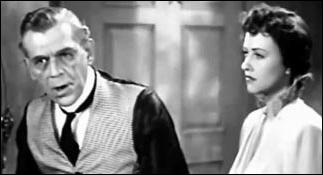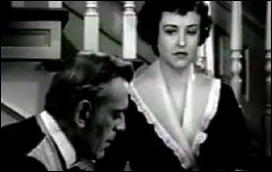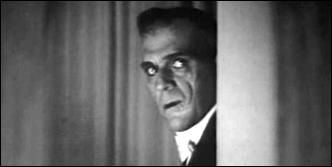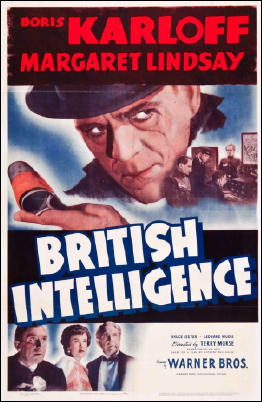Tue 24 Jun 2014
A Movie Review by Jonathan Lewis: BRITISH INTELLIGENCE (1940), with BORIS KARLOFF.
Posted by Steve under Reviews , Suspense & espionage films[3] Comments
BRITISH INTELLIGENCE. Warner Brothers, 1940. Boris Karloff, Margaret Lindsay, Bruce Lester, Leonard Mudie, Holmes Herbert, Austin Fairman. Director: Terry O. Morse.
British Intelligence is a spy film/thriller starring Boris Karloff. He portrays a mysterious, facially scarred, government agent who, under the name Valdar, poses as a French butler in the home of Arthur Bennett, a high-ranking British official.
Based on Three Faces East, a play from 1918 by Anthony Paul Kelly, it’s a fun, albeit not overly sophisticated, spy film with a copious array of characters and a particularly a compelling performance by Karloff. There’s some rather good use of shadow and lighting and enough plot twists condensed into an hour’s running time to keep you guessing what’s going to happen next.
Although released toward the beginning of what was to become the Second World War, British Intelligence is actually set during the First World War. Britain is at war with a bellicose, expansionist Germany which seems to be as much Hitler’s Germany as the Kaiser’s.
But that’s not all that important. What’s significant is that there are spies — many of them, it would appear — afoot and up to no good in England’s capital city. And it’s up to Britain’s intelligence services that are tasked with rooting them out to protect war plans from falling into the hands of the enemy.
Although the plot takes several turns before coming to its resolution, the set up is as follows: British aviator Frank Bennett (portrayed by the South African-born Bruce Lester) is shot down over France. Recovering in a British field hospital, he is tended to by an affectionate nurse (Margaret Lindsay) who, just a scene later, is seen in the company of particularly Prussian-looking German army officers.
Apparently, the good nurse is actually a German spy by the name of Helene Von Lorbeer. Her mission is to go to London and serve in the household of Arthur Bennett (Holmes Herbert), father of the aforementioned wounded Frank. The characters portrayed by two leads — Karloff and Lindsay — of course meet up in the Bennett household. For a while at least, it seems as if Valdar is a German spy as well. As you might imagine, Frank Bennett eventually returns home to London only to find his supposed nurse living in his family home, precipitating a series of events which eventually culminate in the destruction of the local Germany spy ring.
Although Lindsay is good, it’s Karloff who really steals the show in this one. It’s a much better role for him than as the genial scientist in Night Key, for instance, reviewed here. There’s a great scene (around the 24-25 minute mark) in which we see the shadowy face of Valdar (Karloff) while he’s snooping through Arthur Bennett’s office. It’s a reminder of how much an exceptional actor can convey with a facial expression and what good directors and cinematographers can do with lighting.
Although British Intelligence may not be ranked among the best spy movies, it is still a quite good film. There are no major plot holes, the acting is above average, and the story is fairly solid. More importantly, it gives the contemporary viewer a brief window into the mindset of Englishmen who, in 1940, were once again faced with a mortal strategic foe in Germany. In the film’s final scene, Colonel James Yates (Leonard Mudie) sums up the likely attitude of many of Britain’s citizens at the time: “We fight wars only because we crave peace so ardently. But always in the strange scheme of things, some maniac with a lust for power arises . . .â€
Who in the audience wouldn’t have gotten the reference? If the message needed to be clearer, Yates ends the film in dialogue with Arthur Bennett, telling him that when war comes, England will of course fight. It’s worth watching.




June 24th, 2014 at 12:39 am
Besides the fine camera work and the inspired lighting, a great part of the fun of watching this movie is the cat and mouse being played throughout the bulk of it with the viewers. The two leads, Boris Karloff and Margaret Lindsay: Are they on the opposite sides, and if so, who is good and who is bad? Or are they on the same side, and if so, which side?
June 24th, 2014 at 3:03 pm
This is much better than you might expect, and one of Karloff’s better non horror outings. Even better, thanks to Boris it holds up very well.
June 24th, 2014 at 3:30 pm
After the first 10 minutes or so, I didn’t expect much. But once Karloff took center stage, as it were, the movie really became a lot of fun. Some of Karloff’s films with non horror roles are truly mediocre. This is not the case with British Intelligence